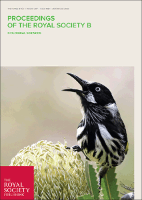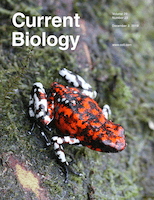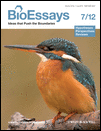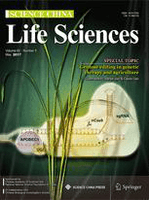
COMPTES RENDUS BIOLOGIES
Scope & Guideline
Your Gateway to Open Access in Biological Research
Introduction
Aims and Scopes
- Pathogen Biology and Antibiotic Resistance:
Research addressing the biology of pathogenic organisms, mechanisms of antibiotic resistance, and the implications for public health and one health initiatives. - Developmental and Cellular Biology:
Studies exploring developmental processes, cellular mechanisms, and the genetic underpinnings of plant and animal biology. - Ecology and Evolutionary Biology:
Research focusing on ecological interactions, evolutionary processes, and the effects of anthropogenic changes on biodiversity. - Genomics and Molecular Biology:
Investigations into the molecular mechanisms of gene expression, epigenetics, and the application of omics technologies in various biological fields. - Neurobiology and Physiology:
Explorations of neuroendocrinology, brain development, and physiological responses to environmental stimuli.
Trending and Emerging
- One Health Approach:
A growing emphasis on the interconnectedness of human, animal, and environmental health, particularly in the context of antibiotic resistance and zoonotic diseases. - Advanced Imaging and Molecular Techniques:
The use of innovative imaging technologies and molecular techniques in developmental biology, allowing for new insights into cellular processes and organismal development. - Cancer Biology and Therapeutic Resistance:
Increased attention to cancer research, particularly mechanisms of therapeutic resistance, highlighting the need for novel treatment strategies. - Impact of Climate Change on Biodiversity:
Research exploring the effects of climate change on ecosystems and species interactions, underlining the urgency of understanding biological responses to environmental stressors. - Functional Genomics and Systems Biology:
An emphasis on systems biology and functional genomics to unravel complex biological processes, particularly in plants and their responses to stress.
Declining or Waning
- Historical Perspectives on Foundational Figures:
Themes related to the historical contributions of figures like Louis Pasteur, while still relevant, have become less frequent as the focus shifts toward contemporary research and its applications. - Traditional Microbiology Studies:
Research centered solely on classical microbiology has seen a reduction, likely overshadowed by more integrated approaches that consider microbial interactions within broader ecological and health contexts. - Basic Plant Biology without Applied Context:
Basic studies of plant biology without direct applications to agriculture or environmental management are being published less frequently, as the journal leans towards impactful, applied research.
Similar Journals

Biology-Basel
Pioneering Research for Tomorrow's SolutionsBiology-Basel is a premier, peer-reviewed open-access journal published by MDPI since 2012, situated in the heart of Switzerland. With an E-ISSN of 2079-7737, this journal serves as a vital platform for the dissemination of innovative research across the broad spectrum of Agricultural and Biological Sciences, Biochemistry, Genetics, Molecular Biology, and Immunology. Recognized for its rigorous editorial standards and impactful findings, it currently ranks Q1 in Agricultural and Biological Sciences and holds impressive positions in several categories according to the 2023 Scopus rankings. The journal’s open-access model ensures that high-quality research is freely available to a global audience, fostering collaboration and knowledge sharing among researchers, professionals, and students alike. Spanning from 2012 to 2024, Biology-Basel is committed to reflecting the latest advancements in biological sciences, making it an essential resource in the ever-evolving landscape of biological research.

BMC Biology, a prominent open access journal published by BMC since 2003, offers a dynamic platform for the dissemination of research in the fields of biology, biochemistry, and biotechnology. Based in the United Kingdom, this journal showcases high-impact studies that cover a broad range of topics including cell biology, developmental biology, ecology, and structural biology, reflecting its commitment to advancing knowledge in the life sciences. With an impressive record of Q1 rankings across multiple categories in 2023, including Agricultural and Biological Sciences and Biochemistry, Genetics and Molecular Biology, BMC Biology stands out as a leader in these disciplines. Researchers will find a robust forum for innovative and high-quality research due to its substantial Scopus rankings, which place it within the top 10% of its field. The journal's open access policy facilitates widespread dissemination, ensuring that critical biological research is accessible to a diverse global audience. Whether you are a researcher, student, or professional in the biological sciences, BMC Biology is essential for staying informed about the latest advancements and developments in this ever-evolving field.

PROCEEDINGS OF THE ROYAL SOCIETY B-BIOLOGICAL SCIENCES
Leading the Charge in Biological InnovationPROCEEDINGS OF THE ROYAL SOCIETY B-BIOLOGICAL SCIENCES, published by the esteemed Royal Society, stands as a premier platform for disseminating cutting-edge research in the fields of Biological Sciences. With an impressive impact factor reflective of its high citation rates and scholarly contributions, this journal encompasses a wide array of disciplines, including Agricultural and Biological Sciences, Biochemistry, Genetics and Molecular Biology, Environmental Science, and Immunology and Microbiology, consistently ranking in the Q1 category across these fields. Since its inception in 1946, it has been committed to advancing our understanding of biological systems and informing evidence-based practices. Researchers and academics can submit their work without the Open Access barrier, thereby maintaining the integrity of the disciplinary discourse while providing comprehensive insights. The journal's location in the United Kingdom also positions it at the heart of global scientific innovation, making it a vital resource for professionals and students alike who are eager to explore the latest trends and breakthroughs in the biological sciences.

CURRENT BIOLOGY
Illuminating Pathways in Agricultural and Biological ResearchCURRENT BIOLOGY is a premier academic journal published by CELL PRESS, dedicated to a broad spectrum of fields within biological sciences. With an ISSN of 0960-9822 and E-ISSN 1879-0445, the journal has established itself as a vital resource for groundbreaking research and advancements since its inception in 1991. CURRENT BIOLOGY boasts high prominence in its categories, securing a Q1 quartile ranking in Agricultural and Biological Sciences, Biochemistry, Genetics and Molecular Biology, and Neuroscience, indicating its significant impact and relevance in these fields. Notably, it ranks #9 out of 221 journals in Agricultural and Biological Sciences, placing it in the 96th percentile, while also maintaining a strong presence in the Biochemistry category with a rank of #26. Researchers and professionals can rely on CURRENT BIOLOGY for comprehensive reviews, innovative methodologies, and crucial scientific developments that bridge theoretical knowledge with practical applications. The journal continues to play an essential role in enhancing the global dialogue in biological research, making it indispensable for students, academics, and industry experts aiming to stay at the forefront of the rapidly evolving landscape of life sciences.

BIOESSAYS
Shaping Tomorrow’s Science Through Innovative ResearchBIOESSAYS, published by WILEY, is a leading academic journal dedicated to the dynamic fields of biochemistry, genetics, and molecular biology. With an impressive impact factor and recognized as a Q1 journal in its category for 2023, it ranks 49 out of 221 in the Scopus database, placing it within the 78th percentile among its peers. Since its inception in 1984, BIOESSAYS has served as a vital platform for researchers, professionals, and students, facilitating the dissemination of pivotal findings, innovative theories, and review articles that shape the current understanding of biological sciences. Although it does not offer open access, the journal remains key for those seeking to stay at the forefront of scientific discovery and discussion within this ever-evolving discipline. With its commitment to high-quality, peer-reviewed content, BIOESSAYS continues to influence future research directions and academic discourse.

INDIAN JOURNAL OF EXPERIMENTAL BIOLOGY
Illuminating Pathways in Experimental ResearchINDIAN JOURNAL OF EXPERIMENTAL BIOLOGY, published by the NATL INST SCIENCE COMMUNICATION-NISCAIR, stands as a significant platform for the dissemination of original research in the fields of biochemistry, genetics, and molecular biology, particularly within the context of Indian scientific advancements. With its ISSN 0019-5189 and E-ISSN 0975-1009, the journal has been an essential resource since its inception in 1965, although coverage in prominent databases like Scopus was discontinued in 2018. The journal ranks in the 57th percentile for Biotechnology, as well as in the 27th and 25th percentiles for Molecular Biology and Cell Biology respectively, underscoring its impact and relevance. While currently not an Open Access journal, it continues to provide valuable insights and contributions from researchers and professionals in the growing field of experimental biology. The esteemed contributions published in this journal enhance our understanding of biological processes and foster the development of innovative solutions to contemporary challenges in health and environmental science.

BRAZILIAN JOURNAL OF MEDICAL AND BIOLOGICAL RESEARCH
Transforming Ideas into Scientific BreakthroughsThe BRAZILIAN JOURNAL OF MEDICAL AND BIOLOGICAL RESEARCH, published by the ASSOC BRAS DIVULG CIENTIFICA, serves as a vital platform for the dissemination of cutting-edge research in the fields of medicine and biological sciences. With an ISSN of 0100-879X and E-ISSN 1414-431X, this Open Access journal has been championing free access to vital scientific knowledge since 1997. It is indexed in Scopus with notable rankings across various disciplines, including a rank of #131 in General Medicine (79th percentile) and #20 in Pharmacology, Toxicology, and Pharmaceutics (75th percentile). Covering a broad scope of topics, the journal primarily focuses on areas such as biochemistry, biophysics, immunology, neuroscience, and physiology, with a commendable categorization of Q2 and Q3 quartiles for several relevant fields in 2023. Through its commitment to high-quality research and robust peer review processes, the journal not only consolidates its reputation within the academic community but also significantly contributes to the enhancement of scientific knowledge and innovation in Brazil and beyond. Researchers, professionals, and students will find an invaluable resource in this journal, which is pivotal for those looking to stay abreast of the latest developments in medical and biological research.

TURKISH JOURNAL OF BIOLOGY
Nurturing Excellence in Biological Research Since 2006TURKISH JOURNAL OF BIOLOGY, published by the Tubitak Scientific & Technological Research Council Turkey, is an esteemed peer-reviewed periodical that serves as a pivotal platform for advancing the fields of Agricultural and Biological Sciences. With a strong focus on innovative research across various biological domains, including Cell Biology, Genetics, and Microbiology, this journal not only fulfills the academic community's quest for high-quality research but also fosters collaboration and knowledge sharing among researchers. The journal's notable impact factors reflect its commitment to excellence, with its latest rankings placing it in Q2 in Agricultural and Biological Sciences (miscellaneous) and in Q4 for several other categories. By offering open access to its content, TURKISH JOURNAL OF BIOLOGY ensures that valuable biological insights are readily available to the global academic community. Its convergence from 2006 to 2024 signifies its longstanding influence in the biosciences, making it an essential resource for researchers, professionals, and students alike aiming to stay at the forefront of biological research and innovation.

Science China-Life Sciences
Leading the charge in innovative biological solutions.Science China-Life Sciences, published by SCIENCE PRESS, is a premier academic journal that stands at the forefront of innovative research and discoveries in the fields of life sciences, spanning crucial areas such as agricultural and biological sciences, biochemistry, genetics, molecular biology, and environmental science. With an impressive Q1 ranking in its respective categories—ranked #5 in Agricultural and Biological Sciences, #7 in Environmental Science, and #17 in Biochemistry, Genetics and Molecular Biology—this journal is recognized for its rigorous peer-review process and significant impact within the scientific community, as reflected in its high percentiles (97th and 92nd). Maintained as an Open Access publication, it ensures broad dissemination and accessibility of research findings, fostering collaboration and knowledge sharing among researchers, professionals, and students alike. Given its position in the research landscape and its commitment to high-quality scholarship, Science China-Life Sciences plays a vital role in advancing life sciences research, supporting scientists in addressing global challenges through innovative biological solutions.

JOURNAL OF BIOSCIENCES
Connecting Researchers to the Heart of BiosciencesJOURNAL OF BIOSCIENCES, published by the Indian Academy of Sciences, has established itself as a pioneering platform in the fields of biosciences, encompassing diverse research areas such as agricultural and biological sciences, biochemistry, genetics, molecular biology, and medicine. With an impressive trajectory since its inception in 1979, the journal has achieved notable recognition, securing a Q1 ranking in Agricultural and Biological Sciences and maintaining its place in the top quartiles for Biochemistry and Medicine as of 2023. With Scopus rankings placing it at #32 in General Agricultural and Biological Sciences and #65 in General Biochemistry, Genetics, and Molecular Biology, the journal reaches the 85th and 70th percentiles respectively, reflecting its impact and relevance in current scientific discourse. Although it does not offer open access, the JOURNAL OF BIOSCIENCES remains crucial for researchers, professionals, and students dedicated to advancing knowledge and innovation within the biosciences, providing a vibrant forum for high-quality research and comprehensive reviews.